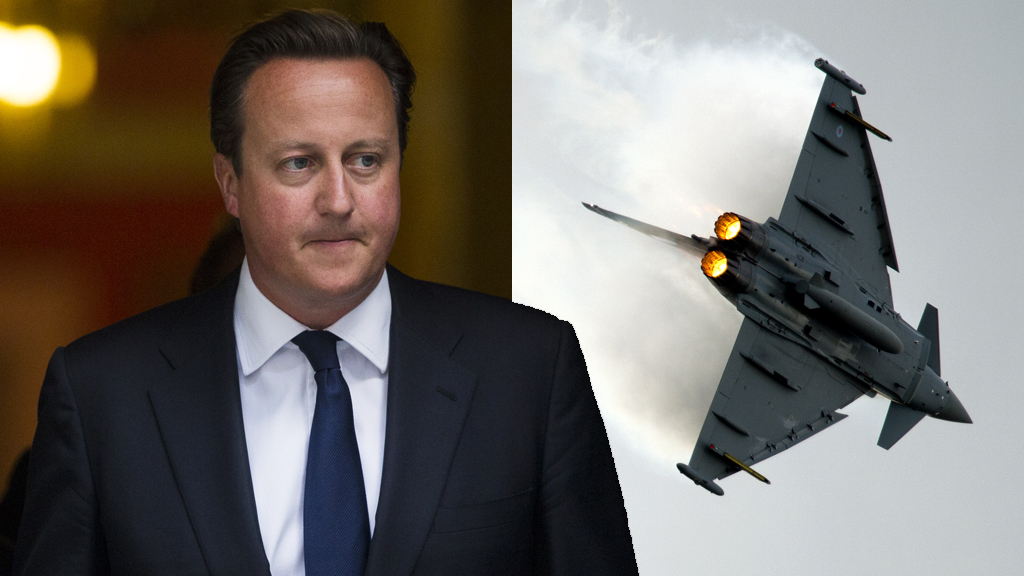Syria: UK intervention ‘permitted’ – even without UN backing
Military intervention would be legally justified on humanitarian grounds, even if blocked by the UN security council, according to a summary of the UK government’s legal advice.

The government published its legal justification summary ahead of a meeting of parliament to debate military intervention.
The advice states that “humanitarian intervention” would be the legal basis for any such intervention, but crucially, says that while the UK is seeking a United Nations (UN) Security Council resolution, it is not essential to back intervention.
“If action in the security council is blocked, the UK would still be permitted under international law to take exceptional measures,” the summary reads.
Click the image below to see the text in full
- Chapters
- descriptions off, selected
- subtitles off, selected
- captions settings, opens captions settings dialog
- captions off, selected
This is a modal window.
This is a modal window. This modal can be closed by pressing the Escape key or activating the close button.

The government also released a letter from the chairman of the Joint Intelligence Committee (JIC), which says that a chemical weapons attack did occur in Damascus last week and that intelligence gathered suggests it is “highly likely” that Bashar Assad’s regime was responsible.
“We also have a limited but growing body of intelligence which supports the judgement that the regime was responsible for the attacks and that they were conducted to help clear the Opposition from strategic parts of Damascus,” the letter read. “Some of this intelligence is highly sensitive but you have had access to it all.”
The JIC is made up of senior civil servants, security analysts and members of the security services.
Responding to the release of the documents this morning, Conservative MP Julian Lewis, who is a member of the parliamentary Intelligence and Security Committee, told the BBC’s World at One that the JIC summary is “inconclusive”.
He said that as he has advanced security clearance as a member of that committee, he would now like to see the intelligence on which the summary was based.
British jets deployed
Defence preparations on the ground are already underway as political parties at home and abroad debate strikes on Syria,
Six British Typhoon jets are being sent to Akrotiri in Cyprus, but are not being deployed to take part in military action against Syria, said an MoD spokesman.
“This is purely a prudent and precautionary measure to ensure the protection of UK interests and the defence of our sovereign base areas at a time of heightened tension in the wider region,” he said.
This is purely a prudent and precautionary measure to ensure the protection of UK interests – MoD
“This is a movement of defensive assets operating in an air-to-air role only. They are not deploying to take part in any military action against Syria.”
In response to reports that western allies are preparing for an attack, President Bashar al-Assad told state TV that Syria would defend itself against any aggression – and that he would destroy any terrorists supporting Israel.
“The threats of direct aggression against Syria will only increase our commitment to our deep-rooted principles and the independent will of our people,” he said. “Syria will defend itself in the face of any aggression.”
- Chapters
- descriptions off, selected
- subtitles off, selected
- captions settings, opens captions settings dialog
- captions off, selected
This is a modal window.
This is a modal window. This modal can be closed by pressing the Escape key or activating the close button.
Legal justification
The government is expected to publish a summary of its legal advice on the case for military strikes in response to the suspected chemical attack that killed an estimated hundreds of people on 21 August.
The move comes ahead of the UK parliament’s recall on Thursday to discuss any potential intervention in Syria. David Cameron was forced to backtrack on offering MPs a vote on Syria strikes, after Labour Leader Ed Miliband changed his mind to say that UN backing was essential. Labour said it will put forward its own amendment, and will not support the government.
Read Gary Gibbon's blog: Labour meets to discuss Syria crisis
As UN experts set off on their third day of investigations in the outskirts of the capital, UN Secretary-General Ban Ki-Moon said they would leave Syria by Saturday morning. But they are expected to need more time – perhaps even a week – to analyse and announce their findings.
Cyprus’s sovereign base areas in the British Overseas Terrirtory, are said to provide a “strategic forward mounting base” in an important region. There are around 2,500 military and UK civilian personnel serving on the bases, along with around 3,000 accompanying family members and dependants.
Russia is also sending two warships to the eastern Mediterranean, said Interfax news agency. The navy later denied the deployment was linked to events in Syria and said it was part of a long-planned rotation of its ships in the area.
As President Assad’s main ally, Russia opposes any military intervention in Syria and says it will not be drawn into conflict. However Russia has been evacuating its citizens from Syria in the past week as international tension has mounted.